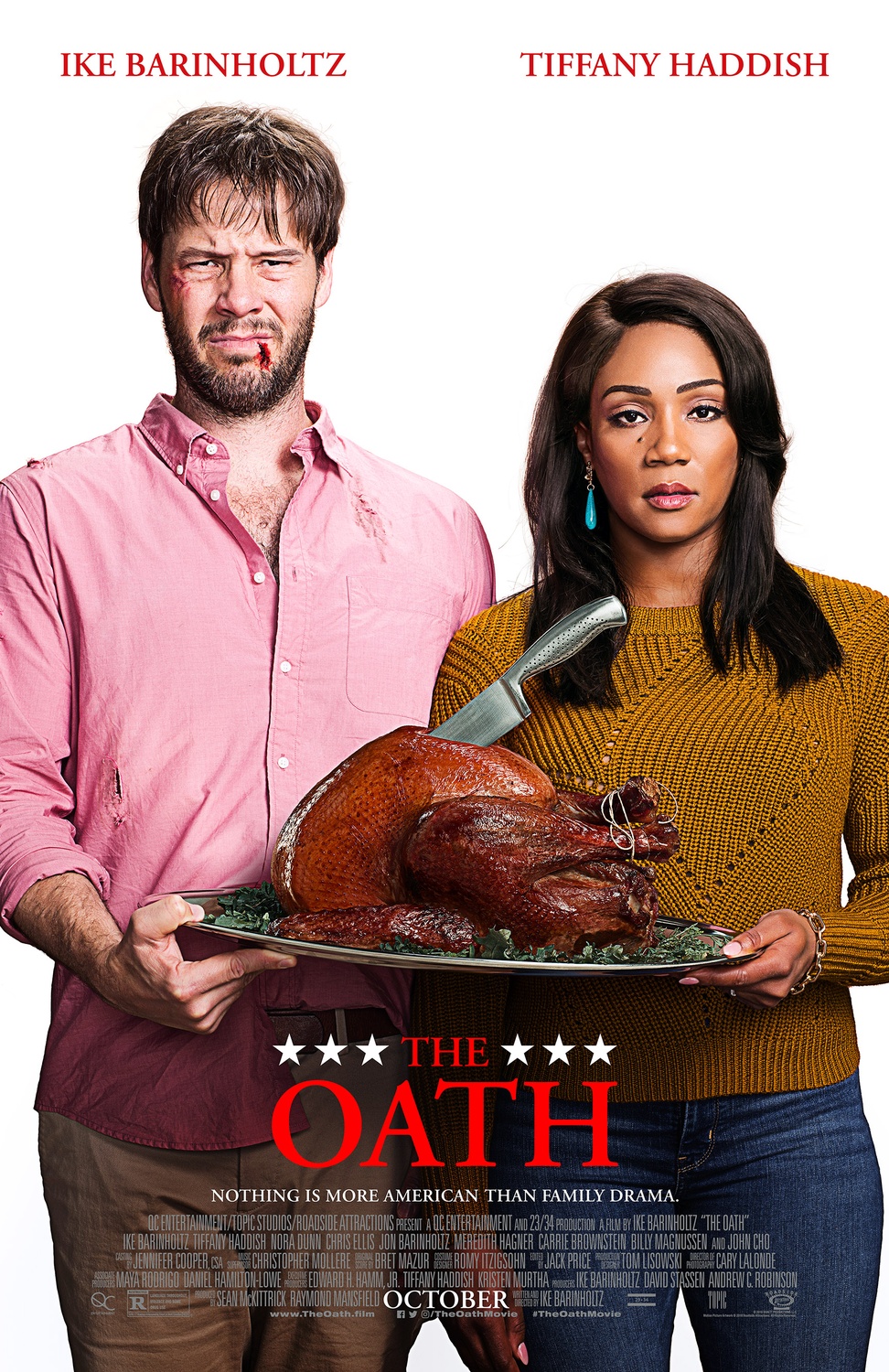
News
Cambridge Residents Slam Council Proposal to Delay Bike Lane Construction

News
‘Gender-Affirming Slay Fest’: Harvard College QSA Hosts Annual Queer Prom

News
‘Not Being Nerds’: Harvard Students Dance to Tinashe at Yardfest

News
Wrongful Death Trial Against CAMHS Employee Over 2015 Student Suicide To Begin Tuesday

News
Cornel West, Harvard Affiliates Call for University to Divest from ‘Israeli Apartheid’ at Rally
‘The Oath’ Is Enjoyable, For a Two-Hour SNL Skit
Dir. Ike Barinholtz—3.5 STARS

The President of the United States announces a controversial act that tears families apart. Diehard conservatives question the loyalty that minority groups hold for our country. Left-wing protests are labeled as violent and irrational, apparently justifying the use of extreme police force in counteraction. No, this isn’t the front page of a newspaper; these familiar scenes merely form the backdrop for Ike Barinholtz’s highly political directorial debut, “The Oath.” The balance between comedy and politics is key to what makes this film unique, but while the humor consistently hits the mark, the political themes lack the emotional impact delivered by movies like “Get Out” and “BlacKkKlansman,” who share a team of producers in common with “The Oath.”
The comedy-thriller follows a traditional American family’s efforts to not get too political on Thanksgiving, which turns out to be easier said than done. Exacerbated by the recent passage of the “Loyalty Oath,” a law which compels Americans to declare their loyalty for their country by Black Friday, the joyous sharing of turkey, stuffing, and pumpkin pie quickly devolves into a gory fightreslting in broken noses, gunshot wounds, and tasers. The question “What are our options?” reverberates through the air, especially as the family must figure out what to do with two government agents they may or may not have accidentally kidnapped. However ridiculous the premise, it does allow for some interesting moral questions, particularly for the protagonist, Chris (Ike Barinholtz).
The family represents a variety of points on the political spectrum, with Chris clearly being the resident liberal. Despite the fact that Barinholtz himself largely shares his character’s political views, Chris does not escape the movie completely unscathed by criticism and satire. He is far from a sympathetic character, perhaps made most clear by the way he treats his family: It is Chris who first starts an argument at Thanksgiving dinner relatively unprovoked, and his constant forgetting of his sister-in-law’s name is both a humorous recurring joke and a jerk move. Ultimately, Chris’ wife Kai (Tiffany Haddish), who shares his political views but not so much his anger, is portrayed in the best light. Haddish’s character as the voice of reason is predictably a highlight of the film, but her portrayal as “the one who’s right” suggests that there is no place for anger in politics.
The movie’s greatest success is in its comic relief, which centers primarily on relatable humor. The subject of a politically divisive Thanksgiving dinner is a popular one to make fun of, partly due to the fact that so many people can relate to the feeling of having that one racist uncle. Of course, “The Oath” amplifies this theme by a thousand — most Thanksgiving dinners probably don’t end in actual bloodshed — but at its core is a family tension that is ripe for satire. For better or for worse, watching this movie will probably give you the same secondhand stress you get from watching your family argue about politics, but at least here you don’t have to fear being dragged in. Other relatable family moments, like the stereotypically awkward relationship between father and son or older parents not quite used to using TV remotes, keep the laughter going at a relatively consistent pace.
However, a political comedy must succeed on two fronts: Not only is it important to keep the laughs going, but a coherent message should also be a thought-provoking undercurrent of the film. This is where “The Oath” begins to show its weaknesses. Though there are plenty of mini political messages here and there, the only unified theme that comes across is that of “family first,” one which we’ve seen countless times in countless formats. The film’s ending relies on a deus ex machina — which would be fine — but it undercuts the real life implications the film only hinted at.
“The Oath” lends itself to comparison with other recent politically charged movies like “Get Out” and “BlacKkKlansman,” in its attempt to combine comedy and commentary. In fact, one of the film’s key selling points, as evidenced by a title card on the film’s trailer, is the fact that the three films share a producing team, comprised of Edward Hamm, Ray Mansfield and Sean McKittrick. Unfortunately, “The Oath” falls short in the way in unconvincingly tries to inspire a politically moving reaction in its audience. With the other two, it would be next to impossible to walk out of the theater without an unsettled feeling in your stomach and a desire to fight injustice. “The Oath,” on the other hand, though enjoyable, ends when you leave the theater. It is perfectly possible to continue living life as you were, and to only remember the movie as a silly Thanksgiving comedy. Sure, expecting a movie to change the viewers’ lives is certainly a high standard to hold it to, but other films have certainly proved that it is possible. As a result, “The Oath” feels like nothing more than a long SNL skit — political comedy that plays it too safe to be anything greater.
Want to keep up with breaking news? Subscribe to our email newsletter.
